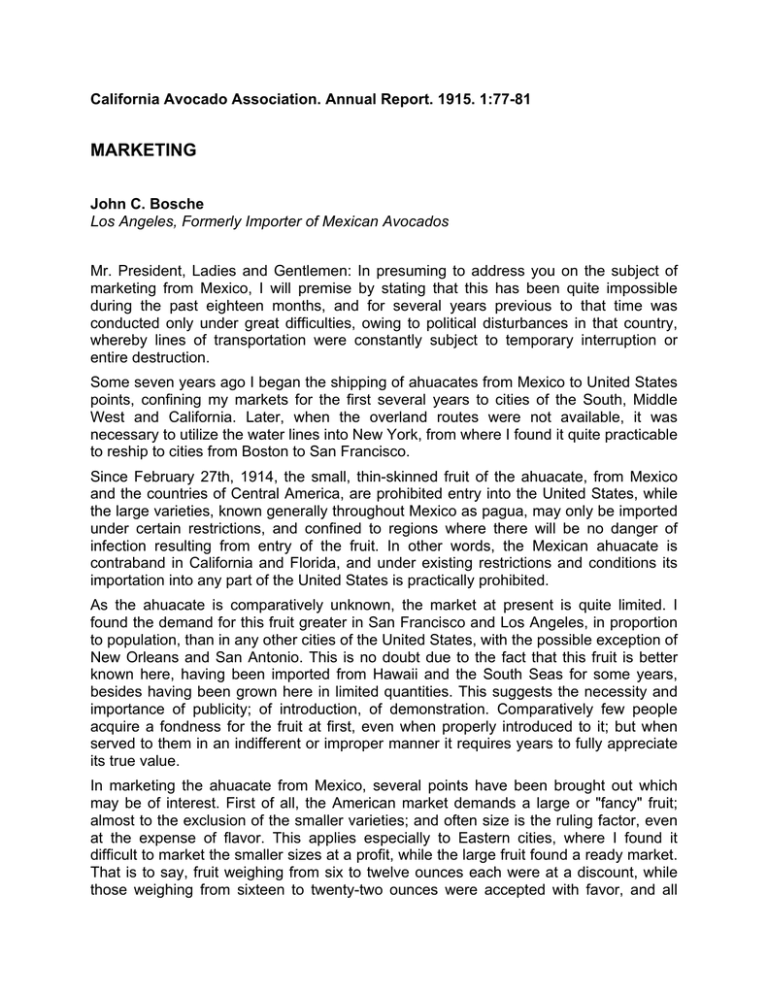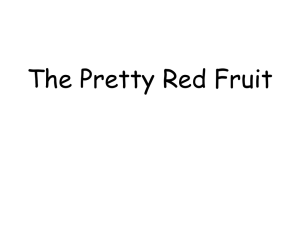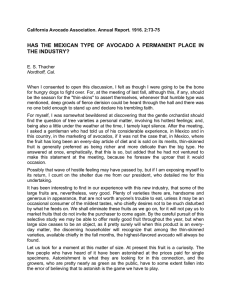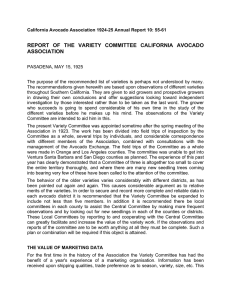MARKETING
advertisement

California Avocado Association. Annual Report. 1915. 1:77-81 MARKETING John C. Bosche Los Angeles, Formerly Importer of Mexican Avocados Mr. President, Ladies and Gentlemen: In presuming to address you on the subject of marketing from Mexico, I will premise by stating that this has been quite impossible during the past eighteen months, and for several years previous to that time was conducted only under great difficulties, owing to political disturbances in that country, whereby lines of transportation were constantly subject to temporary interruption or entire destruction. Some seven years ago I began the shipping of ahuacates from Mexico to United States points, confining my markets for the first several years to cities of the South, Middle West and California. Later, when the overland routes were not available, it was necessary to utilize the water lines into New York, from where I found it quite practicable to reship to cities from Boston to San Francisco. Since February 27th, 1914, the small, thin-skinned fruit of the ahuacate, from Mexico and the countries of Central America, are prohibited entry into the United States, while the large varieties, known generally throughout Mexico as pagua, may only be imported under certain restrictions, and confined to regions where there will be no danger of infection resulting from entry of the fruit. In other words, the Mexican ahuacate is contraband in California and Florida, and under existing restrictions and conditions its importation into any part of the United States is practically prohibited. As the ahuacate is comparatively unknown, the market at present is quite limited. I found the demand for this fruit greater in San Francisco and Los Angeles, in proportion to population, than in any other cities of the United States, with the possible exception of New Orleans and San Antonio. This is no doubt due to the fact that this fruit is better known here, having been imported from Hawaii and the South Seas for some years, besides having been grown here in limited quantities. This suggests the necessity and importance of publicity; of introduction, of demonstration. Comparatively few people acquire a fondness for the fruit at first, even when properly introduced to it; but when served to them in an indifferent or improper manner it requires years to fully appreciate its true value. In marketing the ahuacate from Mexico, several points have been brought out which may be of interest. First of all, the American market demands a large or "fancy" fruit; almost to the exclusion of the smaller varieties; and often size is the ruling factor, even at the expense of flavor. This applies especially to Eastern cities, where I found it difficult to market the smaller sizes at a profit, while the large fruit found a ready market. That is to say, fruit weighing from six to twelve ounces each were at a discount, while those weighing from sixteen to twenty-two ounces were accepted with favor, and all over twenty-two ounces were in strong demand at a premium. Contrary to general opinion, I found the thin-skinned varieties to be remarkably good shippers. Indeed, when cut at the proper time and carefully packed, they will hold up quite as well, if not better, than some varieties of even the hard-shelled fruit. I have no hesitancy in saying that California growers will find no difficulty in shipping the thinskinned varieties to any part of the United States. Another point is that, while ahuacates can be transported long distances under refrigeration and arrive at destination in apparent good condition, it is generally found they will ripen-in badly, especially when a temperature lower than 45 degrees Fahrenheit is maintained. An air temperature of from 50 to 60 degrees is quite ideal for the transportation and preservation of this fruit. Paper wrapping of any kind is injurious. A small amount of coarse excelsior should be used, and packing in single-layer crates is desirable, though not essential, the first requisite being a free circulation at air temperatures, and a dry atmosphere under refrigeration. In marketing from Mexico, many difficulties were encountered in picking, packing, transporting to railways and other lines of transportation, etc., but with the facilities available in this country the California growers will soon determine the best methods for marketing, the most essential requirements being to expand the markets by educating the public to the value of this fruit, and by propagating the best varieties. In addition to the restrictions upon the Mexican ahuacate, there are existing embargoes against the mango, zapote, guava and sweet lime; so that further experiments with the tropical fruits, at least from Mexico for the American market, cannot be made. Experience With Shipments Questioned in regard to the fruit shipped to Chicago and returned, Dr. Coit said: I think most of the people have seen it. I would like to say that I have planned a little shipping experiment that has been worked out very well. We took a number of varieties about two weeks ago, and sent them to the Department of Agriculture at Washington with the request they send them back here immediately, collect. We haven't heard from them. The day after, President Hart sent another one. That box was sent to Chicago with instructions to return. Half of the box was packed intentionally loose to see how they would take the shipment, and the other was packed firmly, and those thin-skinned varieties passed very fairly under that test, although most of them were considerably mulled about. There are hardly more than two or three in the box fit to go on the market at the present time. However, I want to call attention to the fact they were expressed from here to Chicago and back, and they were pretty ripe when packed, so it is a pretty fair test, and you can see the results in the exhibits. Continuing the discussion of transportation, Mr. Bosche said these remarks referred to both thick and thin skin varieties. It is a matter of protecting them, keeping them in the proper atmosphere and properly packed. Reverting to the shipment to Chicago, Mr. Bosche said they had entirely too much packing; that with a little excelsior the fruit could be put through in very proper condition. The fruit should not be wrapped in paper. I was very much interested in the matters referred to by Mr. Rivers. My man is now in Mexico in connection with the avocado business, and I would say that I have packed them, of necessity, in those baskets, because boxes were not available there. I found that by packing them in five or six layers in a little excelsior that they would come through in very fine shape, but that was a necessity. I think a single or a two-layer crate would probably be better, but I have shipped to New York from Mexico, kept them there eight or ten days, and then shipped them to California, Los Angeles, San Francisco, and other cities with less than two per cent loss. The chairman announced that Mr. F. J. Walker has been appointed by the U. S. Government, as a member of the committee to go into Southern Mexico and Central and South America to investigate trade conditions and advance our trade relations. Mr. Walker intends to make a special investigation of the avocado, and has kindly offered to get any information desired in connection with this association for its members. His address is F. J. Walker, San Fernando, California.





